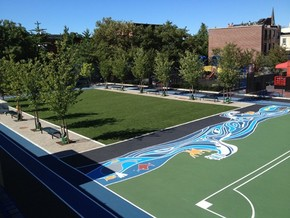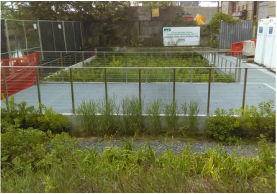Green Infrastructure Bus Tour - Sept 22, 2016
8/17/2016
On Thursday, September 22, NYC Soil & Water Conservation District is having its 6th Annual Green Infrastructure Bus Tour! This year's tour will include five stops in Brooklyn and Queens, visiting a playground, wetland park, art installation, parking lot and streetside rain gardens, and a revitalized waterway access point. See below for a full description of each site.
Tickets for the tour are $5 and do not include lunch. Please pack lunch or plan to purchase lunch nearby during the lunch break. Get your ticket here!
We will meet at 8:30 am at the NYC Soil & Water Conservation District building at 121 Sixth Avenue in Manhattan. Drop off will be in the same location at the end of the day.
Tour Itinerary
P.S. 261 Playground: Green infrastructure playground

The Trust for Public Land (TPL) and the NYC Department of Environmental Protection have been partnering to create green infrastructure playgrounds in 40 schools throughout New York City. P.S. 261 in Boerum Hill was one of the first of these 40 playgrounds, completed in 2013. The green infrastructure project, which students helped design, manages half a million gallons of stormwater onsite every year. The installation includes a storage shed with a green roof, a rain garden, rain barrels, trees in porous concrete pavers and a synthetic turf field with a gravel base that allows water to be absorbed into the ground. Tiffany Briery, Program Coordinator for The Trust for Public Land, will lead this segment of the tour.
Gowanus - Sponge Park & The 2,000 Gallon Project: Wetland park and stormwater art installation

Sponge Park, designed by dland studio of Brooklyn, is a 2,100 square foot plot at the banks of Gowanus Canal. The recently opened park intercepts thousands of gallons of storm water, along with pollutants like heavy metals and dog waste, before it enters the canal. The park features natural filtration from flood-tolerant plantings like asters, Rosa rugosa and sedge grass, as well as a network of sand beds and soils designed to hold water. Sponge Park is a $1.5 million pilot project, overseen by NYC Department of Environmental Protection (DEP), that dland studio hopes will be a model for using green infrastructure and bioremediation to prevent pollution from entering the waterways.
Following the tour of Sponge Park, we will visit an art installation, the 2,000 Gallon Project, a series of blue dumpsters around the Gowanus Canal that make a visual statement about how retaining stormwater can help prevent combined sewage overflow. Each of the ten blue dumpsters symbolizes the volume of water a curbside rain garden can manage – the NYC DEP is currently installing over 90 of these rain gardens throughout the sewershed. The project is a partnership between Alloy Development and the Gowanus Canal Conservancy. Andrea Parker, executive director of the Gowanus Canal Conservancy, will lead the tour of Sponge Park and the 2,000 Gallon Project.
Pratt Institute Parking Lot: Rain garden & permeable parking lot

The redesign of the Cannoneer Court parking lot on Pratt Institute’s Brooklyn campus was led by the Institute’s Sustainable Environmental Systems Graduate program. Head of the program, Jaime Stein and her students worked with the Gaia Institute to retrofit the 100 parking space lot with bioswales, trench drains and plantings to retain and detain stormwater. The parking lot was completed in the spring of 2016. By monitoring the effectiveness of this innovative solution, Pratt hopes to serve as a model for parking lot designs citywide. Jaime Stein will lead the tour of the parking lot.
NYCHA Hope Gardens Houses: Rain garden and porous pavement

Hope Gardens Houses is a New York City Housing Authority (NYCHA) development. Through the NYC Department of Environmental Protection (DEP) Green Infrastructure Program, DEP and NYCHA installed a rain garden at the center of the property to collect stormwater flowing along the walkways, as well as porous pavement and subsurface retention systems that will collect stormwater from a parking lot. These green infrastructure installations were completed in 2013 and now prevent more than 700,000 gallons of stormwater from reaching the combined sewer system each year. There are also rain gardens in the surrounding public right-of-way that will be included in this tour. Mikelle Adgate, Director of Stormwater Management Outreach for DEP, will lead this segment of the tour.
Plank Road: Revitalized street-end and waterfront access

Plank Road used to be an overgrown, muddy and littered street-end. With help from the NY-NJ Harbor & Estuary Program and New England Interstate Water Pollution Control Commission, the Newtown Creek Alliance (NCA) revitalized Plank Road to a cleaner and more inviting public space providing access as well as ecological/historical information about the area.
Situated amongst an extremely dense industrial area that is heavily devoid of green space, the site now offers an inviting landscape for local employees and the general public seeking respite, including views of Newtown Creek that were previously obscured. The site is now a destination for creekside tours, providing participants and future stewards of Newtown Creek an intimate introduction to the unique history and persistent ecosystems of the area. Willis Elkins, Program Manager for NCA, will lead the tour of Plank Road.
The GI Tours are funded through the Conservation Project Financial Assistance program of the New York State Soil & Water Conservation Committee
